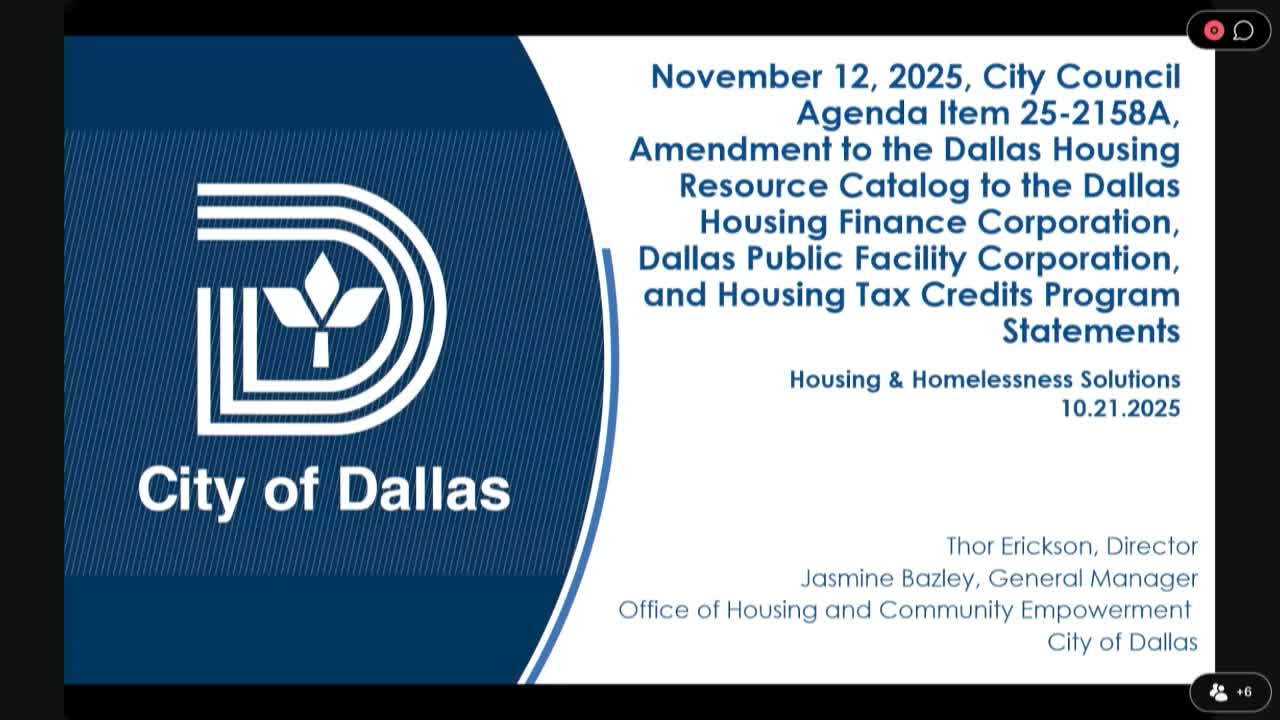Dallas committee pauses proposed HFC/PFC program-statement changes after extensive stakeholder debate

Summary
A staff briefing on proposed amendments to Dallas Housing Finance Corporation and Public Facility Corporation program statements drew extensive council questions. The committee voted unanimously to hold the item for further review and training before forwarding to council.
City housing staff briefed the Dallas Housing and Homelessness Solutions Committee on Oct. 21 about proposed changes to program statements that guide the Dallas Housing Finance Corporation (HFC), the Dallas Public Facility Corporation (PFC) and the city’s review of housing tax‑credit projects.
Thor Erickson, director of the Office of Housing and Community Empowerment, summarized the purpose of the amendments: to clarify administration and compliance roles, prioritize certain geographies for some financing tools, require regular reporting and to set clearer application and public‑benefit analysis processes for projects seeking property‑tax exemptions and other HFC/PFC support. Erickson said stakeholders — including the HFC, PFC, developers and advocates — had been engaged throughout the draft process and that the staff recommendation sought committee feedback on three key open points: (1) whether city staff should have an ex officio seat on the corporations’ boards, (2) geographic prioritization for use of the corporations’ tools, and (3) whether to set caps or reporting limits for tax‑exempt value and projects.
Erickson said the proposed program statements would direct the corporations to develop policies and procedures, track and report the total exempt value of projects, prioritize HFC resources for projects that increase units affordable to households at 50% area median income and below, and ask the PFC to emphasize projects that can bring market‑rate and mixed‑income development to higher‑poverty areas. The draft would also require the corporations to reimburse staff time for administrative support and report details (council district, affordability levels, sources/uses) on a regular basis.
The meeting produced detailed pushback and requests for clarification from multiple councilmembers. Members asked for a 101 briefing and training on how the HFC and PFC operate, where past projects sit geographically, what units and AMI bands were produced in recent years, and how public‑benefit calculations are performed. Councilmembers expressed differing priorities: some favored geographic guardrails to avoid concentration of poverty, others urged flexibility to respond to property distress and to enable projects in higher‑opportunity areas. Several members said they did not want a new policy to change terms for projects already underway.
Representatives from both the HFC and PFC took questions about their application processes, public‑benefit analyses and council engagement. David Ellis (president, HFC) and Keith Pommecole (president, PFC) described standard application steps: early outreach to the councilmember for the site’s district, financial presentations to the corporation’s boards, and public hearings required for tax‑exemption approvals. They said boards review financial proformas, public‑benefit calculations such as rent‑savings analyses, and location issues before recommending inducement or exemptions.
Committee members unanimously moved to hold the proposed amendments for additional review, training and written responses to the technical questions raised. A motion to hold the item at the committee level until staff provides additional training and a memo passed unanimously. Committee members asked staff to provide: a 1‑0‑1 training on HFC/PFC operations, a monthly memo listing projects in the corporations’ pipelines (including council district, unit counts and affordability bands), historical production by AMI band, the program’s total anticipated tax‑exempt value and quarterly reporting on funds generated by the corporations. Staff said they will return with more analysis and an updated calendar before the item proceeds to the November council agenda.

